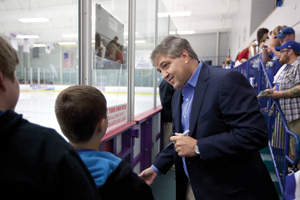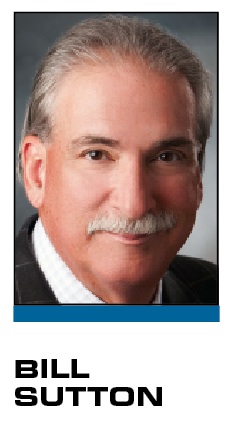The past six months was a whirlwind for me. The best thing about this time was what I learned and observed from the people with whom I interacted. I offer these thoughts for your development and, with hope, your application.
■ Focus groups
Never underestimate the passion people have for your brand and their interest in everything you do on and off the field. I recently completed some work for the Pittsburgh Pirates and was amazed at the power of the brand and love for that brand despite 20 consecutive losing seasons.
It was a beautiful thing to see how the power of being asked for your opinion affected fans and the sense of responsibility they accepted to speak on issues that ultimately affect all fans. Each of the six sessions I conducted exceeded the typical 12-person group, yet the process worked smoothly and was characterized by a high degree of respect for the thoughts and opinions of other participants.
I have also been conducting focus groups for the Tampa Bay Lightning and came away very impressed with the gratitude that the fans showed with regard to being asked their opinions. The groups in both markets showed great willingness to come back for follow-up discussions to help us refine our thoughts prior to a final decision and implementation. I have always been a huge believer in the value of qualitative research as a complement to quantitative research, and I enjoy the lessons from the focus groups as well as the numerous ideas and suggestions I usually receive by email shortly thereafter.
■ Owner perception
I continue to be shocked by the number of owners who fail to realize that how the community perceives them has a direct correlation to the support they receive from that community. I have been fortunate to work with some exceptional owners in my consulting practice and my academic life, but perhaps none having more impact on their community than Jeff Vinik of the Tampa Bay Lightning. Vinik’s approach and that of the Lightning far exceeds the typical community relations role — it is a community investment role.
 |
Jeff Vinik’s involvement in the Tampa community has touched many Lightning fans.
Photo by: SCOTT AUDETTE / TAMPA BAY LIGHTNING
|
Vinik and his senior leadership team identify community heroes in the Tampa area, and each hero is honored at a Lightning home game and given a $50,000 grant that the hero can designate to be given to one or more nonprofit agencies and organizations to assist them in their mission.
What impressed me about this was twofold: Vinik did it for every scheduled game during the 2012-13 season, even those lost to the NHL lockout; and the citizens of the Tampa area were aware of this generosity, appreciated it and supported Vinik and his Lightning team by selling out 21 of 24 games played by a team that did not make the playoffs. I was most moved when, at the conclusion of a focus group I was conducting, one of the participants asked if he could make a statement on camera.
The gentleman went to the camera and thanked Vinik for his support of the community and pledged his support of the Lightning and whatever else Vinik might choose to do in the future. I was further moved when several other participants having observed this, did the same thing. Community investment and owner presence pays dividends.
■ Sales keys
I had the great fortune of co-creating the 5 Star Sponsorship Academy with my friends and former colleagues from the NBA, Scott O’Neil and Chris Heck. The reception the concept received was overwhelming, but our panels consisting of million-dollar sellers and million-dollar buyers reaffirmed several lessons that sometimes get lost in the day-to-day attempts to make the big deal.
First, how well do we communicate with our partners after the deal has been consummated? Are we making sure that activation platforms are working? Do we provide value added? Do we ask if there are any special needs or visitors that need to be accommodated? Do we ask about their business and if there are ways we can support their initiatives that might not be taking place in our venue?
If the answer is no, then you should be thinking about another partner in that particular category as you are probably not as effective as other sports organizations dealing with that same corporate partner.
Another great learning point made by one of our corporate partner panelists was how to interpret silence. She provided her philosophy that if you don’t hear from me it doesn’t mean everything is fine, in fact, it may be the opposite. Meaning, I have decided that this is not only not working for me but I have decided that further interaction is not worth my time. If a number of my readers don’t drop this column immediately and reach for the phone to call a corporate partner, I am surprised and disappointed.
The million-dollar sellers reinforced a point that O’Neil made numerous times — the best salespeople are able to isolate the objection and identify the true impediment to making the sale. It is essential that once the seller hears the objection he/she is able to isolate that objection, probe, offer a solution to that objection, then attempt to close. If the real objection has been isolated and addressed, the close should take place. But if the real issue has not been addressed, it should surface at this point.
■ Emerging managers
I am thrilled to see the under-40 managerial talent in our industry. They are a new breed and share the following traits that are well-received by the people they manage and the people that manage them.
• Great communicators, up and down.
• Excellent recruiters. Can relate to the needs and concerns of young people entering the workforce.
• Intellectually curious. Information seekers who often have libraries and book discussions with their staff.
• Analytics-savvy. Very comfortable with data, using it for decision-making, and as a teaching tool for their sales team.
• Empathetic. Able to understand the importance of work-life balance and giving back.
One last observation: I am always gratified to meet people who enjoy reading this column. So, until we meet, thank you.
Bill Sutton (wsutton1@usf.edu) is the founding director of the sport and entertainment business management MBA at the University of South Florida, and principal of Bill Sutton & Associates. Follow him on Twitter @Sutton_Impact.





